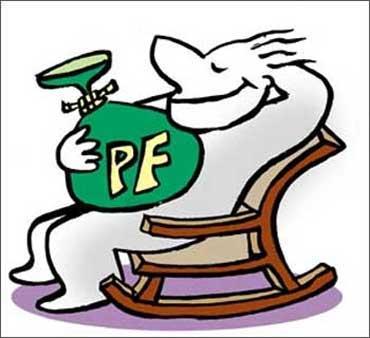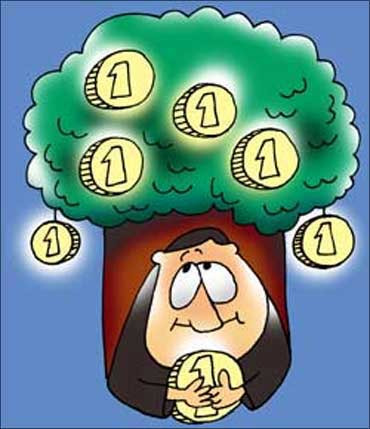Photographs: Illustrations: Uttam Ghosh/Rediff Ashwini Kumar Sharma,OutlookMoney
Avenues to make your savings work harder may not be easy to find. However, for salaried employees, there could be a bonanza very soon.
The Employees' Provident Fund Organisation (EPFO) has recommended increasing the interest rate on EPF to 9.5 per cent for FY 2010-11 from the current rate of 8.5 per cent.
This recommendation to increase the rate of interest comes after the EPFO discovered a surplus of about Rs 1,700 crore (Rs 17 billion) in its suspense account.
EPFO does not use the double-entry method of accounting.
For years, the accounting mechanism followed did not show up the actual surplus in its accounts.
...
Why it makes sense to invest more in your PF
As on 31 March 2009, EPFO - the world's largest EPF organisation - had a 47 million-strong membership.
The increase of 1 per centage point on the interest rate will add about Rs 1,600 crore (Rs 16 billion) to the interest outgo for the year, which will be funded from the suspense account.
Employees contribute 12 per cent of their basic pay towards the Employees Provident Fund (EPF) and an equivalent amount is contributed by the employer.
You may voluntarily increase your contribution from 12 per cent to 100 per cent of your basic pay. But the employer is not bound to contribute at the same enhanced rate.
To increase your contribution, you need to inform the accounts or the payroll department of your company in writing.
...
Why it makes sense to invest more in your PF
Should you increase?
A fixed, assured and a tax-free return of 9.5 per cent is unthinkable from any other investment avenue with a sovereign guarantee.
Applying the four principles of investing - risk, return, liquidity and tax efficiency - increasing your contribution makes sense.
Your additional contribution will also help you to build a healthy retirement corpus.
...
Why it makes sense to invest more in your PF
The added advantages are:
Tax-efficiency. The total fund you receive at retirement - both mandatory and voluntary contribution along with interest - will be tax-free.
The total amount you contribute towards EPF will be eligible for tax deduction under Section 80C of the Income Tax Act.
However, the upper limit under the Section is Rs 100,000.
Loan eligibility. Many organisations provide loan against the EPF fund to their employees at cheaper rates compared to other loans in the market.
So, the more you contribute, the more will be your fund size, in turn, enhancing your loan eligibility.
...
Why it makes sense to invest more in your PF
Things to remember
Every year, EPFO declares the interest rate for the financial year and it may decrease or increase it. You need to revisit and check a few points while making any decision:
Contribution. Many companies internally manage the funds and don't permit stoppage of additional contribution in the middle of a financial year. So, check before you make a commitment.
Lock-in. In most cases, withdrawals are governed by the rules of the respective trust.
Your EPF fund will remain intact till you retire. However, there are some relaxations in special cases - such as marriage, housing and child's education.
Assets allocation. Suppose your total monthly saving is Rs 15,000 over and above your mandatory EPF contribution of Rs 3,000 and you invest this amount in equity-based instruments.
If you divert Rs 3,000 out of it towards EPF, your asset allocation gets affected.
Your debt allocation will increase from 16.67 per cent to 33.33 per cent. So, before you enhance your contribution, bear this in mind.
Why it makes sense to invest more in your PF
Richer pitcher
The new interest rate on the Employees' Provident Fund (EPF) is going to make you a tad richer. Here's how:
Let's suppose, X is 45 years old and has a basic salary of Rs 25,000
Existing rate
His monthly PF contribution is Rs 3,000 (12 per cent of basic (Rs 25,000)
Current interest rate = 8.5 per cent.
Years to retire = 15
Total corpus out of self-contribution = Rs 10,55,674
New rate
If the interest rate is 9.5 per cent, it would fetch him Rs 11,52,122 (around a 10 per cent higher corpus).
If X doubles his contribution to Rs 6,000 (24 per cent of basic), he would get Rs 23,04,245 (assuming the interest rate remains the same throughout).








article